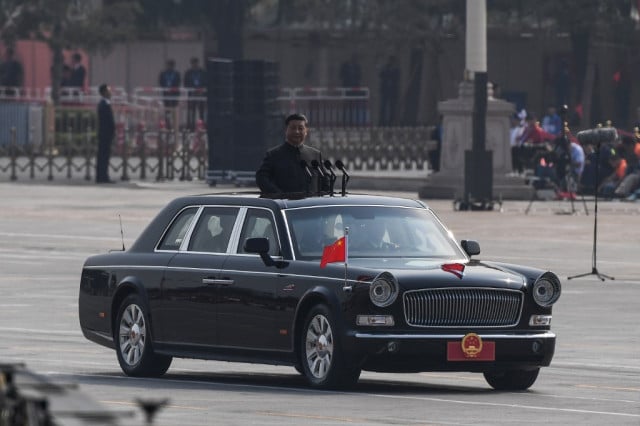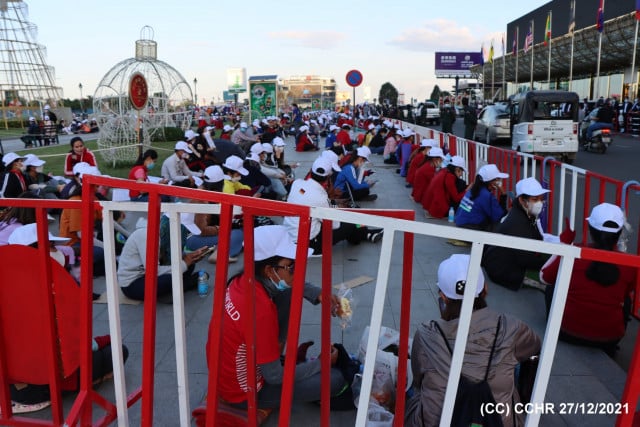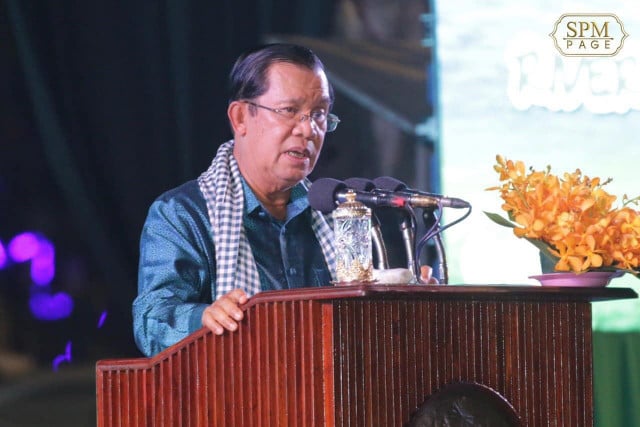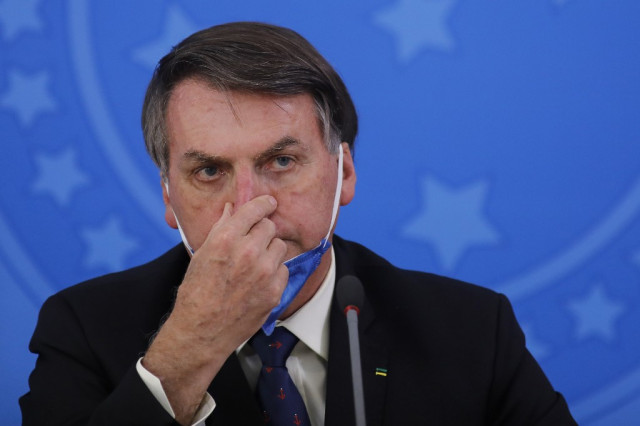China celebrates 70 years as Hong Kong seethes

- Thmey Thmey
- October 1, 2019 4:09 AM
Beijing -- President Xi Jinping declared Tuesday that "no force" can shake China as he oversaw a huge military parade to celebrate 70 years of Communist Party rule, shadowed by protests in seething Hong Kong that threatened to steal the spotlight.
Some 15,000 troops along with tanks, missiles and high-tech drones paraded down the Avenue of Eternal Peace as Xi and other Communist Party leaders watched from a rostrum overlooking Beijing's Tiananmen Square.
The event was meant to extol China's journey from a poor nation broken by war to being the world's second largest economy, but Xi faces a clutch of challenges from a US trade war to months of unrest in Hong Kong.
Xi, who wore the distinctive "Mao suit", delivered a speech invoking the "Chinese dream" of national rejuvenation -- his grand vision of restoring the country to perceived past glory.
"There is no force that can shake the foundation of this great nation," Xi said from the Tiananmen rostrum where Chairman Mao Zedong proclaimed the People's Republic of China on October 1, 1949.
"No force that can stop the Chinese people and the Chinese nation forging ahead," the country's most powerful leader since Mao said before reviewing troops in an open-roof car.
Helicopters flew in a "70" formation over the city as troops goosestepped across Tiananmen Square in what state media described as the country's biggest ever military parade.
The People's Liberation Army brought out its newest pieces of hardware, including the DF-41, a nuclear-capable intercontinental ballistic missile with range enough to reach the entire United States, and the DF-17, a launcher for a hypersonic glider.
Warplanes soared through the smog-choked skies, and a high-altitude, high-speed reconnaissance drone made a public appearance for the first time, Xinhua reported.
"The party hopes that this occasion will add to its legitimacy and rally support at a time of internal and external challenges," Adam Ni, China researcher at Macquarie University in Sydney, told AFP.
US trade war negotiations have dragged on, and African swine fever has raced through the country's pig supply, sending pork prices soaring.
But the major headache is Hong Kong, where pro-democracy protesters hit the streets early in a bid to grab the spotlight from Beijing, with a series of rallies against what they see as the erosion of their special freedoms.
Hong Kong police said they were expecting violence across the city, warning it could be "very, very dangerous", while masked protesters said that "in the face of tyranny, we can only fight as if our last battle".
Officers fanned out across the territory and small pockets of demonstrators marched through the streets for what they dubbed a "Day of Grief".
The semi-autonomous city has been embroiled for months in the worst unrest since Britain returned it to China in 1997, with police and hardcore protesters trading tear gas and petrol bombs.
In his speech, Xi said China "must adhere" to the one country, two systems policy governing Hong Kong and "maintain the long-term prosperity and stability" of the city.
He also called for the "peaceful development" of relations with Taiwan -- the self-governed island that Beijing considers a renegade province -- but said China should "continue to fight for the full reunification of the country."
- 'Protect its interests' -
The festivities were held under tight security, with road closures and even a ban on flying kites.
Access to the Beijing parade was restricted with police turning away crowds lining up with flags in the hope of catching a glimpse of the military procession.
Movie theatres organised screenings of the celebrations.
The military show of force was followed by a pageant involving 100,000 civilians and 70 floats depicting China's greatest achievements. Organisers will release 70,000 doves and 70,000 balloons before an evening performance and fireworks in Tiananmen.
"Beijing wants to highlight its military modernisation, political unity, and determination to protect its interests," Ni said.
- Party adapts -
The Communist Party has repeatedly defied the odds to remain in power for seven decades.
Under Mao, tens of millions of people died during the disastrous Great Leap Forward, and the country was plunged into violent chaos during the decade-long Cultural Revolution.
After Mao's death in 1976, the party launched the reform and opening-up policy under paramount leader Deng Xiaoping, starting decades of breakneck growth and development.
But the party retained a stranglehold on power, sending troops to end the biggest challenge to its rule in 1989 when pro-democracy protesters occupied Tiananmen Square.
Xi has made clear that he believes only the Communist Party can make the country realise its dream -- with him at the helm.
"The Communist Party will continue to ensure that it remains the sole political authority in China," said Drew Thompson, visiting senior research fellow at Singapore's Lee Kuan Yew School of Public Policy.
"It will continue to adapt to do that and it will continue to seek to provide social goods and economic goods for its people, and as long as it continues to deliver those public goods, then it will likely stay in power, but the manner by which it does I think will change over time."















